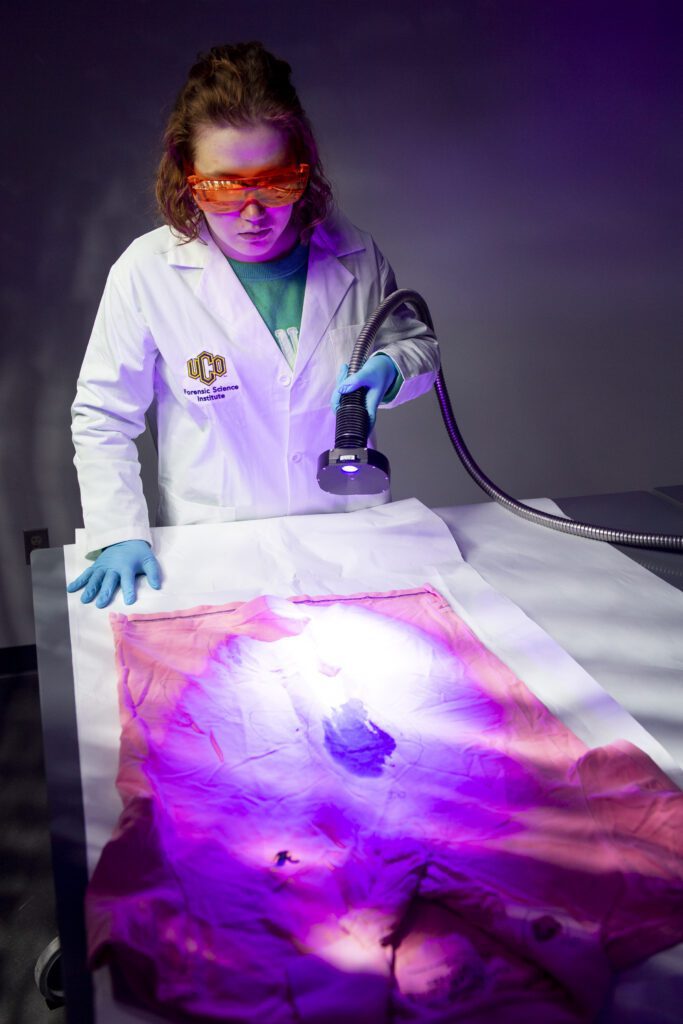Forensic science – the application of scientific principles and methods to examine and interpret evidence in matters of civil and criminal law – is a diverse and evolving field. New technologies are emerging in real time, and universities are doing their part to offer students a variety of degree plans and real-world experience to support successful careers.
Jason Beaman, D.O., M.S., M.P.H., FAPA, is a forensic psychiatrist, an associate clinical professor and the interim chair for the School of Forensic Sciences at Oklahoma State University Center for Health Sciences (OSU-CHS) in Tulsa. The forensic sciences program offers master’s degrees and doctorate degrees, alongside graduate certificates and even forensic nursing courses.
“Our Doctor of Forensic Sciences (DFS) degree is geared towards people who have professional experience and don’t need to take certain classes because they already have the applied on-the-job skills, while our Ph.D. program is more for individuals with research and academic interests,” says Beaman. “We offer real-life experiences for our students. We have a full-functioning DNA lab, forensic toxicology lab and an explosives and fire range. We also offer internships with the Tulsa Police Department and Medical Examiner’s office.”
With plans to grow the program, Beaman says OSU-CHS will offer new programs this fall, such as crime analysis, and threat assessment and management.
“We’ve expanded our coursework into studying serial killers, and I’m offering a class this summer over the events at Waco,” he says, referring to the 1993 government siege and massacre of a compound belonging to a religious cult, the Branch Davidians, in Waco, Texas. “Next summer we’re having a class where we’ll be evaluating the Oklahoma City bombing through the lens of a forensic psychiatrist.”

At the University of Central Oklahoma (UCO) in Edmond, the Forensic Science Institute offers undergraduate and master’s degrees in forensic science and is adding a doctoral program in the fall. The Institute’s undergraduate program is a concurrent bachelor’s degree program which requires students to double major, and the combination depends upon the student’s interests and desired career field.
“We offer four different forensic science (FS) tracks: forensic investigations, FS-digital forensics, FS-chemistry and FS-molecular biology,” says Cait Porterfield, a forensic sciences instructor at UCO currently working towards her doctorate in educational psychology and instructional technology. “For example, if you want to be a DNA analyst, you would choose FS-molecular biology and couple it with a biology degree, or if you want to be an investigator, you would choose forensic investigation and couple it with a criminal justice or psychology degree. The forensic science degrees only add 36 additional credit hours, so it usually takes five years instead of four to complete, but you graduate with two diplomas.”
Porterfield also notes that all of the Institute’s undergraduate and graduate programs are accredited by the American Academy of Forensic Sciences, and many faculty members previously had distinguished careers in the field.
“Our professors offer insight from actual investigations they’ve worked,” she says. “We also offer our students many opportunities for internships, or what we call practicums, working with the Edmond Police Department, Oklahoma State Bureau of Investigation, Medical Examiner’s office, Indigent Defense System and the Innocence Project. Forensic science is such a unique field that regardless of what you’re interested in, there’s a job for you. If you enjoy art, you could be a forensic artist, or if you really like computers, you could be a digital forensics examiner, where you examine cell phones, computers and social media activity.”
Another interesting component to the field is the role forensic scientists play in court proceedings through testifying.
“Many of our courses offer students the opportunity to analyze evidence and then testify to that evidence in a mock courtroom,” says Porterfield.
Looking towards the future, Beaman says the field of forensic sciences has a bright future.
“We’re moving from general examiners into more subspecialty areas, and the requirements to perform these types of evaluations and procedures are becoming more strict,” he says. “It’s a profession with a thriving job market in Oklahoma as well as throughout the country.”
Background image cutline: Alongside a fully functioning forensic toxicology lab, the Oklahoma State University Center for Health Sciences (OSU-CHS) program offers an explosives and fire range to help students gain hands-on experience.
Photo courtesy OSU-HSC






















